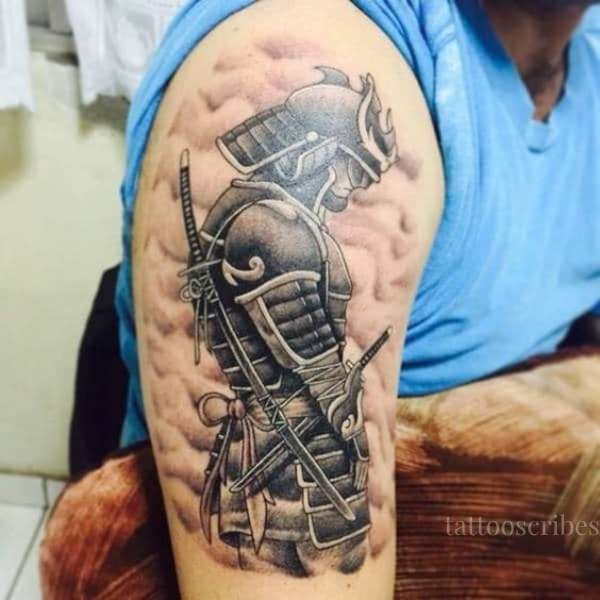Imagine stepping into a tattoo shop, the excitement building as you choose your next piece of art. With its powerful symbolism, a samurai tattoo could be the perfect addition.
Samurai tattoos are more than just designs—they carry deep meanings, representing courage, honor, and protection.
Keep reading to explore these tattoos’ spiritual symbolism and significance and find the perfect design for you.

What Does a Samurai Tattoo Mean?
A samurai tattoo represents courage, honor, and commitment. It signifies discipline, respect for rules, and strength in the face of adversity. Many designs also reflect personal integrity and protection.
General Symbolism of Samurai Tattoos
- Honor – Living by a personal or moral code.
- Discipline – Mastery over mind, body, and actions.
- Courage – Facing challenges fearlessly, even against danger.
- Loyalty – Commitment to family, friends, or ideals.
- Protection – Represents guarding oneself and loved ones.
You may also like below posts:

Cultural Meanings of Samurai Tattoos
- Japanese Heritage – Represents the samurai class and Bushido code.
- Bushido Philosophy – Embodies loyalty, respect, and ethical conduct.
- Warrior Spirit – Tattoos honor bravery, skill, and battlefield prowess.
- Spiritual Guidance – Samurai imagery can invoke protection and wisdom.
- Legacy and Tradition – Celebrates Japan’s historical and cultural values.
Samurai Tattoo Variations and Designs
- Armor and Helmets – Symbolize protection and warrior status.
- Katana Sword – Courage, precision, and discipline.
- Samurai Mask (Men-yoroi) – Strength and intimidation against enemies.
- Full-Body Samurai – Represents complete mastery and dedication.
- Cherry Blossom Accents – Life’s fleeting beauty alongside warrior strength.
Find out how to select the best artist here.

Color Variations of Samurai Tattoo
- Red – Passion, bravery, and vitality.
- Black – Power, focus, and strength.
- Gold/Yellow – Honor, prosperity, and wisdom.
Learn more about aftercare here.
Other Symbolic Meanings of Samurai Tattoos
- Resilience – Overcoming hardships with strength and grace.
- Focus – Represents mental clarity and unwavering purpose.
- Wisdom – Connection to experience and life lessons.
- Sacrifice – Dedication to duty above personal gain.
- Respect – Signifies reverence for tradition and others.
Meaningful Placement Ideas
- Arm/Sleeve – Shows strength and warrior spirit outwardly.
- Back – Ideal for full-body or large, detailed designs.
- Chest – Close to the heart for loyalty and honor symbolism.
- Leg/Thigh – Personal power and resilience on display.
- Shoulder – Courage and readiness to face challenges.
People Also Ask
What does a samurai tattoo symbolize?
It represents honor, courage, discipline, loyalty, and protection.
Are samurai tattoos only for men?
No, both men and women wear them to reflect personal strength.
What does a samurai mask tattoo mean?
It symbolizes protection, power, and intimidation against adversity.
Do cherry blossoms in samurai tattoos have meaning?
Yes, they represent life’s fleeting beauty alongside the warrior’s strength.
Where is the best placement for a samurai tattoo?
Commonly on the arm, back, chest, shoulder, or thigh.
Can samurai tattoos honor Japanese culture?
Yes, they celebrate heritage, history, and the Bushido warrior code.
Final thought
Samurai tattoos are more than just art; they embody timeless virtues of honor, courage, and loyalty.
By choosing a design rooted in cultural respect and personal meaning, you can carry the warrior’s spirit as a reminder of strength, resilience, and individuality in life’s journey.
